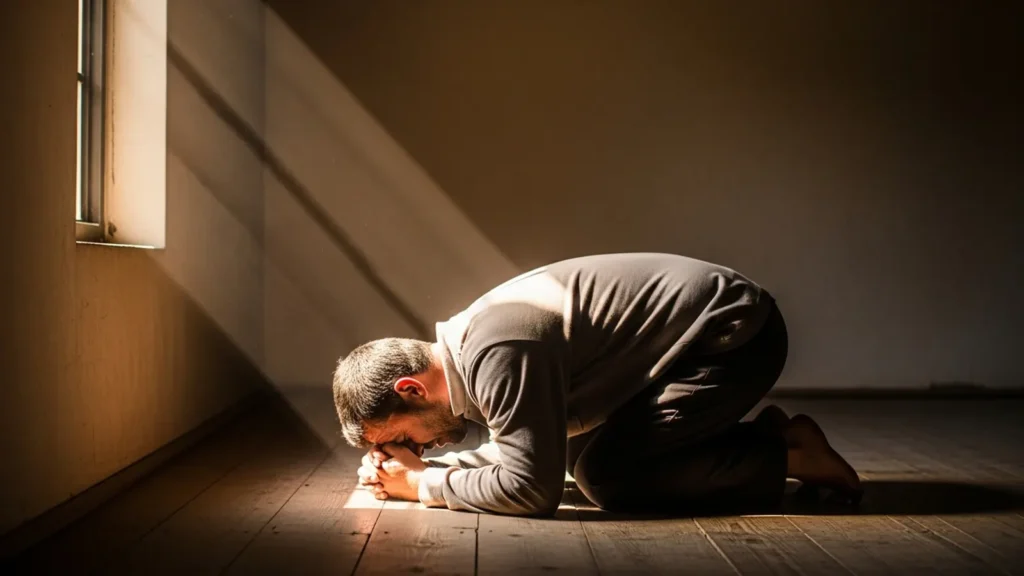Featured verse:
“let everything that has breath praise the Lord” — Psalm 150:6
The phrase “let everything that has breath praise the Lord” is the majestic closing of the Book of Psalms — a song that lifts the heart of every creature to God. It is the apex of worship, the climax of a faith journey that passes through tears, victories, and hopes. This invitation is not merely a poetic suggestion, but a command of love: that every heartbeat, every sigh, every voice be used to glorify the Creator.
We live in a fast-paced world, where praise is sometimes replaced by hurry and worry. But the psalmist reminds us of something essential: as long as there is breath, there is a reason to worship. Praising is not just singing — it is recognizing God’s goodness in every detail, breathing with gratitude, and living in communion with Him.
The invitation is for everyone — men, women, youth, the elderly, peoples and nations. It is a universal call, because breath is the same breath that God gave to Adam in Eden (Genesis 2:7). And if breath comes from God, its natural return is praise.
Today, as you dive into this reflection, allow the Holy Spirit to renew in you the joy of living and praising. May every breath become a silent testimony of gratitude, and every word a song of faith.
Devotional Summary
The call “let everything that has breath praise the Lord” reminds us that every breath is a divine gift and an opportunity to worship. To praise is to recognize God’s presence and power in all circumstances, whether in times of joy or pain.
Highlights:
- Breath is the symbol of the life that proceeds from God.
- Praise is a natural response to the divine presence.
- Praise frees, heals, and restores the heart.
- All creation participates in worship.
- As long as there is life, there is reason to praise.
The origin of breath: the breath that gives life
The book of Genesis takes us to the beginning of everything, when “the Lord God formed the man from the dust of the ground and breathed into his nostrils the breath of life; and the man became a living soul” (Genesis 2:7). This breath is more than air — it is the presence of God Himself dwelling in creation.
When the psalmist declares “let everything that has breath praise the Lord,” he invites us to recognize that the same breath that gives us life must be returned in the form of worship. Every breath is an act of dependence on God, a reminder that without Him nothing stands.
The divine breath connects us to the Creator:
- It is the visible sign of invisible life.
- It is the link between the temporal and the eternal.
- It is the fuel of the soul that seeks communion with God.
To praise, therefore, is to return this breath in the form of gratitude. When we use our breath to grumble, we waste the gift. But when we use it to worship, we honor the Giver of life.

Psalm 150: the climax of worship
Psalm 150 is the last song of the Psalter, and each of its verses is an invitation to celebration. “Praise the Lord in his sanctuary; praise him in his mighty heavens” (Psalm 150:1). This psalm not only concludes the book, but also sums up the entire theology of worship: everything begins and ends in praise.
Note that the psalm does not limit praise to a place, time, or instrument. It expands it to infinity:
- Praise him for his mighty acts.
- Praise him for his excellent greatness.
- Praise him with the sound of the trumpet, harp, and lyre.
- Praise him with dancing, tambourines, and cymbals.
Each expression is a manifestation of the joy that overflows from a grateful heart. It is the invitation for the entire universe to join the heavenly symphony.
Just like the psalmist, we are invited to make praise a lifestyle — not just a Sunday practice, but a constant response to God’s faithfulness.
Praising in the midst of struggles
It is not always easy to praise. Sometimes breath seems to fail — because of pain, exhaustion, or circumstances. Yet it is in these moments that praise becomes most powerful. The apostle Paul and Silas, imprisoned and wounded, sang hymns to God in jail, and the chains were broken (Acts 16:25–26).
Praise is a spiritual weapon. It transforms environments and frees oppressed hearts. Praising is not denying the pain, but affirming God’s sovereignty over it.
Some reasons to praise even in adversity:
- Praise attracts the presence of God (Psalm 22:3).
- Praise renews hope and faith.
- Praise changes the spiritual atmosphere.
- Praise gives strength when the soul grows weary.
When the enemy tries to steal your breath with fear, anxiety, or sadness, remember: if there is still breath, there is a reason to sing.
Creation that praises
The Psalms are full of references to nature worshiping the Creator. “The heavens declare the glory of God; the skies proclaim the work of his hands” (Psalm 19:1). The wind, the sea, the animals, and even the stones bear witness to God’s greatness.
Creation is the first choir of worship.
- The sun rises and sets in obedience to the divine order.
- The birds sing in the morning, praising the Creator.
- The sea roars in reverence to its Lord.
- The trees sway like raised hands in adoration.
If even voiceless creation worships, how much more should we, who have been given the gift of speech and spiritual awareness! The breath God gave us is the most sacred instrument we possess.

The transforming power of praise
Praising is not only a devotional act — it is a transforming force. When we praise, we open spiritual doors that the enemy cannot shut. In 2 Chronicles 20, Jehoshaphat sent singers ahead of the army, and the enemy was defeated while the people sang: “Give thanks to the Lord, for his steadfast love endures forever!”
Praise has the power to:
- Break spiritual chains.
- Bring inner healing.
- Fill the heart with joy.
- Renew courage and faith.
- Produce victory in battles.
Every time we use our breath to praise, something changes within us and around us. Praise is the sound of active faith, the cry of a soul that trusts even without understanding.
Praise that is born of gratitude
True worship is born of gratitude. It is not only singing, but recognizing God’s blessings in the small and the great things. “Give thanks in all circumstances, for this is God’s will for you in Christ Jesus” (1 Thessalonians 5:18).
Gratitude transforms our perspective. Instead of focusing on what is lacking, we look to the abundance of divine grace. A grateful heart always finds reasons to praise, even in storms.
Three attitudes that cultivate grateful praise:
- Daily remembering the blessings received.
- Giving thanks before seeing the miracle happen.
- Sharing testimonies of faith and provision.
The more we give thanks, the more we recognize God’s movement in our lives.

Praise as a lifestyle
Praising is not an event, but a way of living. It is walking in constant communion with the Holy Spirit, allowing every gesture, word, and choice to glorify the name of God.
Paul exhorts us: “Whether you eat or drink, or whatever you do, do it all for the glory of God” (1 Corinthians 10:31). True praise goes beyond songs — it is in how we treat people, in the way we forgive, and in how we trust amid trials.
A lifestyle of praise involves:
- A humble and grateful heart.
- Words that build up.
- Acts of kindness and service.
- Faithfulness in every area.
- Perseverance even without applause.
When praise becomes part of our being, God’s presence is continually manifested.
Eternal praise
The psalmist concludes by saying: “Let everything that has breath praise the Lord. Hallelujah!” This is a foreshadowing of eternal praise, when all nations, peoples, and languages will unite before the throne of the Lamb (Revelation 7:9–10).
The praise we begin here on earth will continue into eternity. Every note of worship will echo in heaven. And on that day, there will be no more tears or pain — only the perfect harmony of God’s presence.
Moment of prayer and reflection
Lord, thank You for the breath of life.
Teach me to use every breath to worship You.
May my heart never be silent before Your greatness. Hallelujah!
FAQ – Let Everything That Has Breath Praise the Lord
1. What does “let everything that has breath praise the Lord” mean?
It means that every living being, who breathes and has life, should worship God. It acknowledges that breath comes from Him, and therefore every creature is called to praise Him.
2. Why is Psalm 150 considered the apex of worship?
Because it closes the book of Psalms with a universal cry of praise, bringing together all instruments, voices, and creatures to exalt the Creator.
3. Can I praise even in difficult times?
Yes. Praise is even more powerful in times of pain, because it demonstrates faith and trust. When we praise in trials, we declare that God is greater than our circumstances.
4. Does praise have spiritual power?
Yes. Praise attracts God’s presence, breaks chains, brings deliverance, and changes the spiritual atmosphere around those who practice it sincerely.
5. How can I make praise a lifestyle?
By seeking to live with gratitude, purity of heart, and constancy in communion with God. True praise is not limited to music — it is a daily attitude of love and surrender.
Conclusion — Let Everything That Has Breath Praise the Lord
“Let everything that has breath praise the Lord” is more than a phrase — it is a mission. It is the daily reminder that every breath is a gift, and every word can become praise. When we live like this, breath ceases to be just air and becomes living prayer.
Today, as you breathe, praise. As you walk, praise. As you wait, praise. Because the God who gave you breath is the same who renews your strength every morning.
READ ALSO:
- You Are the Light of the World: The Divine Call to Reflect
- Behold, I Stand at the Door and Knock: A Call to Open the Heart to Christ
- Psalm 52: Understand the Message of Justice and Trust
FOLLOW US ON FACEBOOK